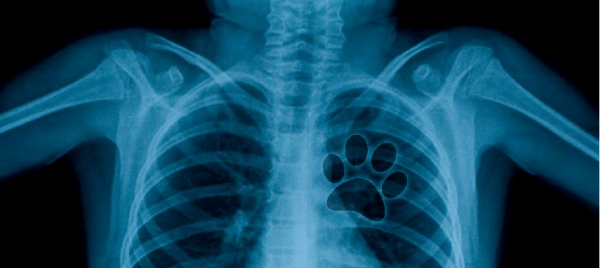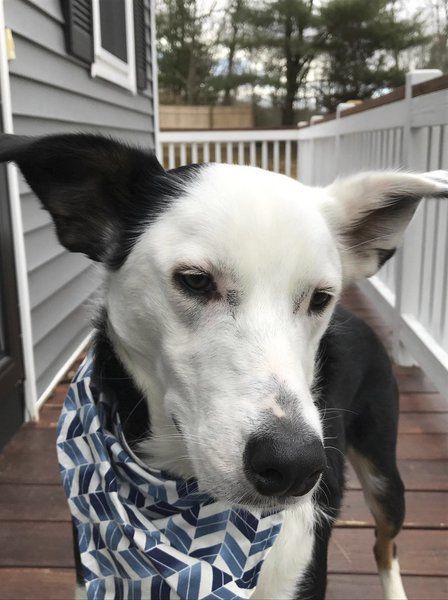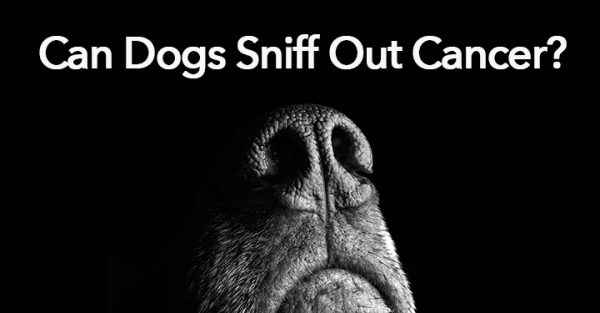As a cop who has battled cancer for years, I gravitate to stories with science having to do with cops, cancer and canines. Canines? As of late, research studies indicate that dogs can smell cancer in humans. The unexpected meshing of a blind dog named “Dude” and his police officer owner, Megan Tierney, evolved into a fateful moment, and at least one of them didn’t even know the magnitude of what was to come of it.
Officer Tierney, 33, is a police officer with the Newburyport Police Department in Massachusetts, a small 38-member police force serving a population of approximately 17,920. As a small law enforcement agency, the slightest hint of unsettling news sent ripples not only within the department but throughout the tight-knit New England community.
Home one night was one of those 38 thin blue line members who, accompanied by her blind Border Collie/Australian Shepherd mix dog “Dude” laying near her, noticed her canine was especially focused on her chest area, sort of exhibiting signs of alertness to…something. Like any dog owner, Tierney wondered what her furry friend was trying to communicate. Officer Tierney focused her gaze upon a spot on her chest to which Dude was drawing her attention. There it was: a tissue swell.

Talk about a blessing in-disguise!
Reporting for the Newburyport News, Amanda Getchell wrote, “Tierney, the Newburyport Police Department’s school resource officer, said she was laying in bed when Dude…jumped up and placed his paw on her chest. What she thought was a tissue swell was diagnosed later by doctors at Dana-Farber Cancer Institute as stage-two triple negative invasive ductile breast cancer.”
“He’s my dude,” Officer Tierney giggled as she spoke with Getchell. “Dude found the lump and we were never so happy because it just meant that we could get it where it was rather than not knowing.”

Given that blindness dramatically enhances remaining senses in humans, it is plausible that the same heightened acuity of smell, sound, and touch is exponentially increased in canines. Is that how Dude was able to hone-in and sniff-out Officer Tierney’s cancer? I believe so.
Can Dogs Really Sniff-out Cancer?
It pays to start with the numbers, so let’s examine the extraordinary olfactory phenomena of a canine by way of the smell-test.
According to Dogs Naturally Magazine, “Dogs have 25 times more smell receptors than humans, boosting their smelling ability by 100,000 times. The brain of a human is dominated by the visual cortex, but the brain of a dog is controlled by the smell or olfactory cortex, which is approximately 40 times larger than that of a human. Furthermore, the olfactory bulb in a dog has a large number of smell-sensitive receptors, which range between 125 to 220 million, and it is a hundred thousand to a million times more reactive than that of humans.”
Although it is universally known that dogs’ amazing feature is its sense of smell, and we just clarified and attested to their most enormous degree possible, how does it all translate to cancer detection by canines?
I came across several studies pertaining to dogs’ capacity to smell cancer, but most are white papers laden with scientific acumen requiring its own study, lots of coffee, and copious amounts of migraine tabs. Deferring to Tammana Khare, this noted authority on canine dynamics will give us the skinny and allow us to get a leg up on how this works exactly.
“Cancerous cells release different metabolic waste products than healthy cells in the human body. The difference of smell is so significant that the dogs are able to detect it even in the early stages of cancer. Dogs are able to identify the chemical traces in the range of parts per trillion. Some studies have confirmed the ability of trained dogs to detect the skin cancer melanoma by just sniffing the skin lesions. Furthermore, some researchers have proven that dogs can detect prostate cancer by simply smelling patients’ urine. Dogs may also be able to sniff out the presence of cancerous cells through a human’s breath,” explained Khare.

Various other studies related to our subject matter had promising results. One in particular which correlates with Officer Tierney’s situation involving Dude originated from the Pine Street Foundation in which “breath samples of 31 breast cancer patients, 55 lung cancer patients and 83 healthy people were presented to five trained scent dogs (three Labrador retrievers and two Portuguese water dogs). These dogs were able to detect or rule out breast and lung cancer, at all stages of the disease, with approximately 90 percent accuracy,” reported Dogs Naturally Magazine.
I have a rather disgusting yet touching story to share on the notion of dogs’ superb ability to smell cancer. My cancer history involves three different neoplasias, two of which are bone cancers. My Siberian Husky is unwavering in his daily routine to sniff then lick the area of my residual leg where scar tissue is present and masks dead cancer cells (dead cells never purge from the cancer-afflicted body). He is like a surgeon with his own brand of “sterile sauce” and an unmasked nose detecting nature gone awry. I will forever find this fascinating, including the ultra-concentrated doggy swathing sessions. That’s my boy’s saga. And that’s my bone for the day.
Officer Tierney has her own version of a Dude’s detection skills leading to the instrumental prolongation of her life while she combats cancer as a cop. She iterates the support system in place at the PD and how her police colleagues have her back both on and off the streets. “In all of this, the thing I take away is that you need to treat each other gently. We’re tough, we’re cops, we’re so hard on each other.”
https://t.co/EJaM6LJqK2 | Triple negative is positive
— Newburyport Police (@NewburyportPD) April 8, 2018
As a retired cop with cancer (and a dog), I’ve been in those shoes. Officer Tierney is spot-on: perspectives alter; conscience is raised; fragility of life is embraced exponentially. As Officer Tierney related, “There’s a lot of perspective I think I’ve found in all of this.”
To the agency’s social media site, Newburyport police administration posted sentiments regarding Officer Tierney and her husband, Joshua, also a Newburyport cop: “You may have noticed our officers wearing pink ribbons on their uniforms the past couple of weeks. We stand by them as a department and ask as a community for you to do the same.”
I always knew my police cohorts would be behind me, but they showed pillared strength when mine significantly diminished. When in-patient for the latest in a series of tests, surgeries, and recoveries, I could hear the police radios crackling down the hospital hallways, getting louder. There is something grand about a cluster of blue uniforms around a white-sheeted gurney. I could smell the Febreze cops often employ to freshen a uniform covering a ballistic barrel (vest). I was just a dude using my senses in proximity to cancer, yet no match for a canine’s sniffing machine.
One of the OpsLens sections under which we publish material categorically is Celebrating Heroes, attributable to soldiers, police officers, and noteworthy first responders or service-oriented folks we feel deserve the limelight for whatever feats they’ve accomplished. The story you just read happens to have two individuals we honor and acknowledge as heroes: a Dude and a courageous policewoman named Megan Tierney.
















